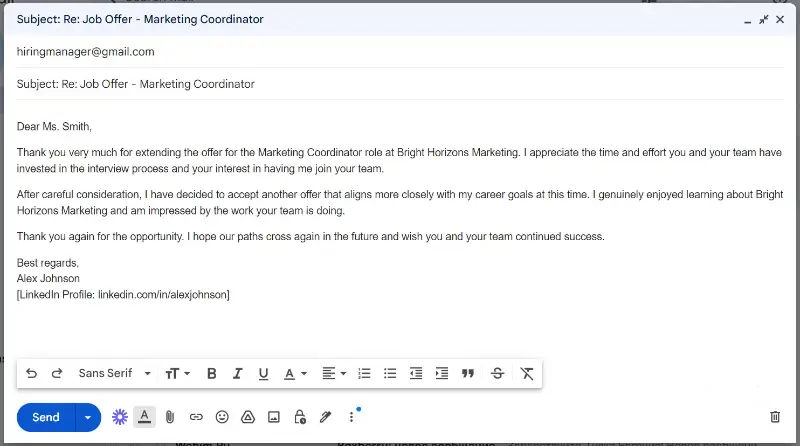On one hand, having two job offers is a testament to your skills and marketability. On the other hand, the pressure to make the right choice can be overwhelming.
This guide will explain how to decide between two job offers. We’ll explore key factors to consider, such as salary, benefits, company culture, and career growth opportunities.
By the end, you’ll be equipped with a clear framework to evaluate your options and make an informed decision that aligns with your personal and professional goals.
Resume examples to help you get two and more job offers:
How to decide between two jobs?
Identify your long-term and short-term career aspirations. For example, becoming a general manager in your field within the next five years or gaining expertise in a specific area.
Determine your financial needs and goals, such as saving for retirement, buying a home, or ensuring a steady income to support your lifestyle.
Rank your list based on what is most important to you at this stage of your life and career. Use a scale of 1 to 10, with 1 being the highest priority.
For example:
- Financial stability
- Career advancement
- Work-life balance
- Continuing education and skills development
- Job satisfaction
- Job security
- Workplace culture and environment
Once you've established the importance of each factor, create a comparison chart. List the priorities in the rows and the two job offers in the columns. Assign scores to each job offer based on how well they meet your priorities.
Here's an example of a pros and cons list between two jobs:
| Priority | Importance | Job Offer A | Job Offer B |
|---|---|---|---|
| Career Goals | 9 | 8 | 6 |
| Work-Life Balance | 8 | 5 | 9 |
| Financial Stability | 7 | 7 | 8 |
| Company Culture | 6 | 6 | 7 |
| Location | 5 | 7 | 6 |
| Job Role and Responsibilities | 8 | 9 | 7 |
| Learning and Development | 6 | 8 | 5 |
After scoring, calculate the weighted scores by multiplying the importance level by the scores for each job. Sum the totals to get an overall score for each job offer.
- What are weighted scores?
- They are used to reflect the importance of different elements within a total score by assigning different weights to each element. An example is how most schools score their students based on homework, midterm tests, and a final exam.
Sample weighted scores table when deciding between two job offers:
| Priority | Importance | Job Offer A | Weighted Score A | Job Offer B | Weighted Score B |
|---|---|---|---|---|---|
| Career Goals | 9 | 8 | 72 | 6 | 54 |
| Work-Life Balance | 8 | 5 | 40 | 9 | 72 |
| Financial Stability | 7 | 7 | 49 | 8 | 56 |
| Company Culture | 6 | 6 | 36 | 7 | 42 |
| Location | 5 | 7 | 35 | 6 | 30 |
| Job Role and Responsibilities | 8 | 9 | 72 | 7 | 56 |
| Learning and Development | 6 | 8 | 48 | 5 | 30 |
| Total | 352 | 340 |
Reflect on your findings and how each job feels to you. Consider any potential for proximity bias and make sure your decision aligns with your overall life goals and values.
While the numbers provide a clear comparison, also pay attention to any subjective feelings or gut instincts about each position.

Below you'll find several factors you should pay attention to when thinking how to choose between two job offers.
1. Salary and benefits
Salary, the direct financial compensation you receive for your work, is often the most immediate factor to consider. It impacts your day-to-day financial stability, affecting your ability to cover living expenses, save for future goals, and maintain your lifestyle.
However, job benefits are equally important and can sometimes outweigh a higher salary.
Benefits can vary widely depending on the employer, but here are some common ones:
- Health insurance. Covers medical expenses and reduces out-of-pocket costs.
- Retirement plans. Helps save for retirement, often with employer matching.
- Paid time off (PTO). Allows time for vacations, illness, and personal needs without losing pay.
- Bonuses. Provides extra income based on performance or company success.
- Professional development. Offers training and education to advance valuable skills and career.
- Childcare assistance. Supports employees with childcare needs, easing family responsibilities.
- Employee discounts. Provides savings on company products or services.
- Life insurance. Protects employees' families financially in case of death.
- Wellness programs. Promotes well-being through gym memberships or mental health support.
If the job with the lower salary offers a comprehensive health insurance plan with lower out-of-pocket costs and a generous retirement match, it could result in long-term savings and a better overall quality of life.
Sarah was offered two jobs—one paying $80,000 with minimal benefits, and another offering $72,000 but with full family health coverage, a 5% 401(k) match, and 4 weeks of paid vacation. After calculating the savings on insurance premiums and retirement contributions, she realized the second offer actually provided greater overall value and chose that job for better long-term financial security and work-life balance.
2. Work-life balance
Imagine you're choosing between two jobs:
- Company A promises a higher salary and opportunities for advancement but requires long hours and frequent travel.
- Company B offers a more modest salary and slower career progression but has a flexible schedule and emphasizes a supportive work environment.
If you value having time for family, hobbies, or personal projects, Company B's focus on work-life balance might make it more appealing. The ability to work from home or leave early for personal commitments can lead to a more fulfilling life and reduced stress.
David accepted a high-paying role at a startup, but after a year of 60-hour weeks and missed family events, he burned out. He later joined a mid-sized company that offered remote work and no weekend emails. Even with a 15% pay cut, David reported feeling significantly happier, healthier, and more productive.
3. Company culture
In the collaborative company, the emphasis is on teamwork, open communication, and a shared sense of purpose. If you're someone who thrives in dynamic, team-oriented settings where creativity and input are valued, this environment might appeal to you.
Conversely, if the other company has a more traditional culture, where roles are clearly defined and procedures are established, it might offer a predictable routine. For someone who prefers a clear hierarchy, this environment could provide the clarity that you find motivating.
The culture essentially determines how well you'll fit in, how engaged you'll feel, and ultimately, how satisfied you'll be in your new role.
Priya accepted a job at a large corporate firm known for its structured environment. While the role aligned with her skills, she found the rigid hierarchy and formal communication style stifling. After a year, she moved to a startup where collaboration and open feedback were part of the culture. Although the startup came with less job security, Priya felt energized by the creative freedom and sense of belonging.
4. Career growth opportunities
These opportunities reflect how much you can advance within the company, which can significantly impact your long-term career trajectory and job satisfaction.
Let's say you're wondering how to decide which job to take: one from a large corporation with a structured promotion path and one from a smaller startup with a more fluid hierarchy.
Corporation:
At the corporation, you might have clear milestones and training programs designed to help you climb the ladder. This might provide a sense of security and a roadmap for advancement.
Startup:
The startup might present opportunities to take on varied roles, build a broad skill set, and make a tangible impact on the company's success. Career growth may be less linear but faster.
Jason started his career at a multinational corporation. There he followed a well-defined path—completing training modules and receiving predictable promotions every few years. After five years, he transitioned to a startup where he initially took a lateral role. Within 18 months, Jason was leading a product team and directly influencing company strategy. While the startup environment was less stable, the accelerated learning curve and leadership opportunities dramatically advanced his career.
5. Job responsibilities
The nature of the work you'll be doing day-to-day can significantly impact your job satisfaction, career growth, and overall well-being.
First, consider how the role aligns with your career goals. One job might offer a chance to work on projects that are closely related to your long-term ambitions. These could include leading a team or developing expertise in a particular field.
Second, think about the duties you'll be handling. A role that requires skills and tasks you're excited about or already proficient in can be more fulfilling and less stressful.
Emily, a recent marketing graduate, was offered two roles. One at a major agency managing client accounts, and another at a nonprofit where she’d create and execute full campaigns. The agency role sounded prestigious, but mostly involved administrative support. The nonprofit role gave her creative control, analytics responsibility, and social media strategy—all aligned with her interests. She chose the nonprofit, and within a year, had a strong portfolio and a promotion to Marketing Manager.
6. Location
A longer commute means spending more time traveling to and from work. For example, a 60-minute trip each way can add up to 10 hours a week. This might affect your work-life balance and personal time.
Plus, commuting can be expensive. If one job requires a 30-minute drive each day, you might spend $200 a month on gas and maintenance. Conversely, a job with a 10-minute commute might reduce those costs significantly.
Carlos was choosing between two offers. One at a prestigious firm in the city, requiring a 90-minute commute each way; and another at a smaller company just 15 minutes from his home. While the city job paid $8,000 more annually, the long commute left him exhausted. He ultimately accepted the local job, gaining 12+ hours of personal time each week and saving nearly $150/month on transportation.
7. Company stability
When deciding between two jobs, company reputation can play a crucial role in your choice. A stable organization typically provides a sense of security, with less risk of sudden layoffs or financial troubles.
For instance, if one company has a solid financial track record and a history of steady performance, it may indicate a lower likelihood of unexpected disruptions, giving you confidence in the longevity of your role.
Nina accepted a role at an exciting new startup offering stock options and a fast-paced environment. Six months later, the company lost a major investor and laid off 40% of the staff—including her team. She later took a position at a well-established firm with slower growth but consistent profitability. While it lacked the startup's thrill, she appreciated the stability and was able to plan her finances and path with more confidence.
FAQ on how to choose between two jobs
- Can I negotiate terms if I have multiple offers?
- Yes, you can use multiple offers as leverage to negotiate better terms, such as salary, benefits, or work arrangements, with the company you prefer.
- How do I weigh salary against other benefits?
- Calculate the monetary value of each benefit and assess how they meet your personal and financial needs.
- What if one job has a higher salary but less career growth potential?
- Evaluate if the job with less growth potential still allows you to develop valuable skills that could benefit your career in the future.
- How can I assess company culture?
- Look into employee reviews on sites like Glassdoor or Indeed and ask current or former employees about their experiences. Pay attention to the work environment during your interviews and interactions with potential colleagues.
- What about choosing between the current job and a new job offer?
- When deciding between job offer and current job reflect on your level of satisfaction. Are you happy with your role, team, and the work you do? Compare this to the potential satisfaction you might gain from the new role.
Conclusion
In conclusion, choosing between two job offers is a significant decision that requires careful consideration of various factors.
By evaluating salary, benefits, company culture, career growth opportunities, work-life balance, and long-term goals, you can make a well-informed choice that best suits your personal and professional aspirations.
Remember, there is no one-size-fits-all answer; the right decision is the one that aligns with your values and future plans.
Create your professional Resume in 10 minutes for FREE
Build My Resume






